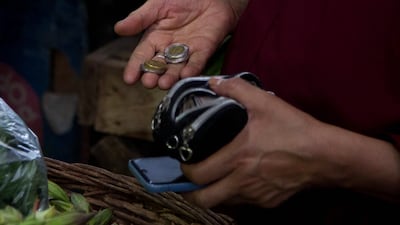Egyptian President Abdel Fattah El Sisi has reappointed Mostafa Madbouly as Prime Minister and asked him to form a new government.
The move comes after the cabinet resigned on Monday amid a series of economic challenges and growing discontent over recent austerity measures.
“Today, I assigned Dr Mostafa Madbouly to form a new government that includes the necessary expertise and competencies to manage the next phase in order to achieve the desired development in government performance and confront the challenges facing the state,” Mr El Sisi said.
His office outlined objectives including the need to maintain national security in light of regional and international challenges, prioritise human development, particularly in health care and education, as well as to continue efforts to boost political participation.
The presidency also stressed the importance of security, stability and counter-terrorism efforts, and the development of culture, national awareness and a moderate religious discourse.
The new government will be required to maintain economic reform, attract and increase domestic and foreign investment, and encourage the growth of the private sector.
Mr El Sisi also called for concerted efforts to regulate markets and curb inflation.
The directive comes at a time when Egypt is navigating a challenging economic landscape and undergoing significant structural changes.
The country recently introduced a series of austerity measures, as required by its creditors, including the lifting of a bread subsidy that left many Egyptians concerned about their ability to afford basic necessities amid record-high inflation and diminishing spending power.
Cairo secured more than $50 billion in funds after finalising agreements with several foreign partners, including an $8 billion package from the International Monetary Fund that came with stringent conditions calling for reduced public spending, a tight monetary policy and a greater economic role for the private sector.
The decision to raise the price of subsidised bread to 20 piastres a loaf, from five piastres, came into effect on June 1 but caused widespread concern and was criticised by civil society groups and legislators.
The move, aimed at reducing the financial burden on the state, has further stoked public discontent as the underprivileged struggle to cope with the rising cost of living.
Despite the influx of foreign aid, many Egyptians feel that their immediate needs are being overlooked in favour of long-term economic reforms.
The new government will face the challenge of balancing debt reduction and economic growth while addressing pressing issues such as unemployment and the overbearing role of the state and military in the economy.
Mr El Sisi was sworn in for a third term on April 2, marking a decade in office for the former army general whose rule has fundamentally changed the most populous Arab nation.
In 2022, four years after Mr Madbouly's cabinet was formed, it underwent a partial reshuffle. Thirteen ministers were replaced, including those in charge of health, irrigation and water resources, and tourism.
Mr El Sisi stated at the time that the changes were made after consultations with Mr Madbouly to improve government performance in key sectors and enhance service delivery for Egyptian citizens.















